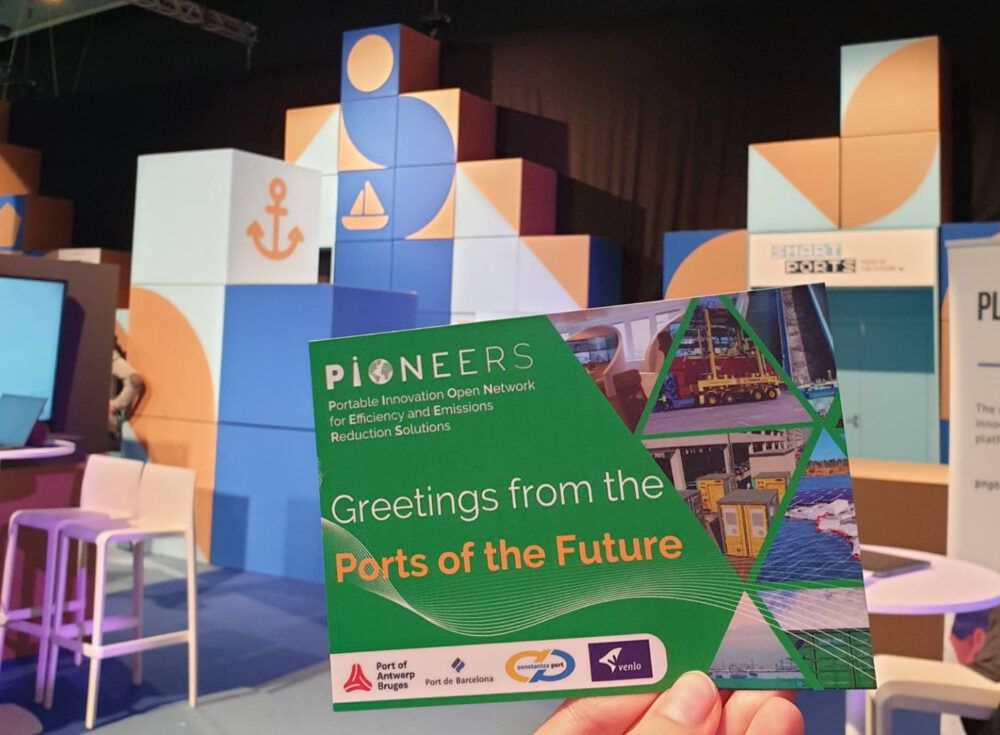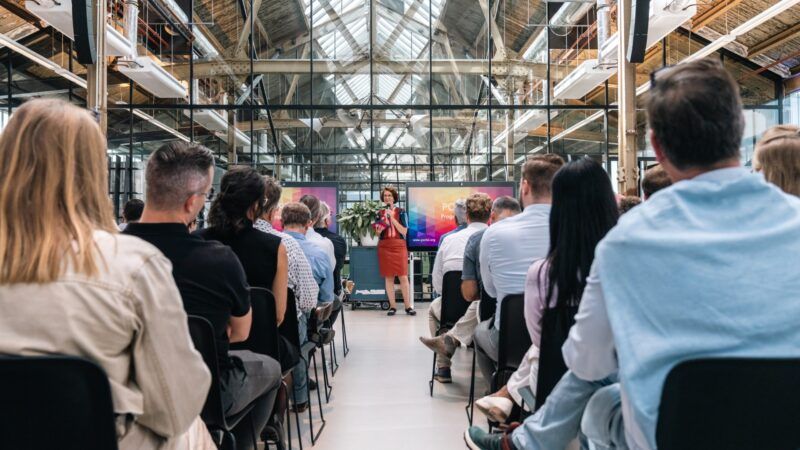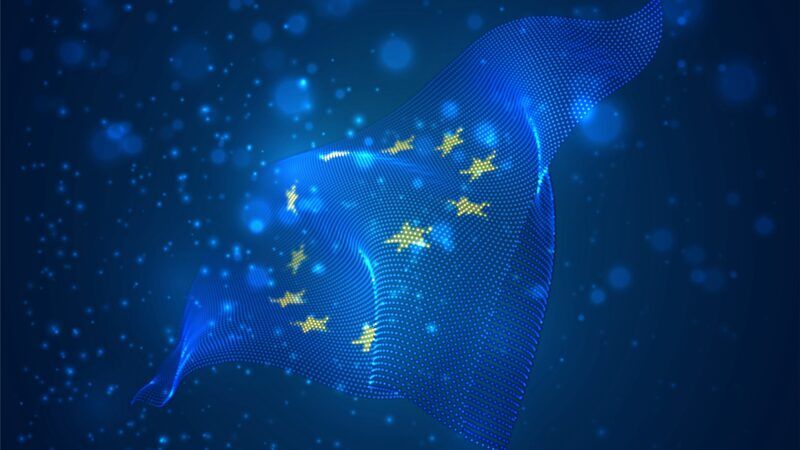
PIONEERS discusses in Barcelona the future of port sustainability
Barcelona hosted on November 8 and 9, 2023, the General Assembly of PIONEERS, the project of the ports of Antwerp-Bruges, Venlo, Constanta and Barcelona to work on the production and supply of clean energy, the design of sustainable ports, modal shift and optimization of flows and digital transformation.
Pioneering ports in Barcelona
Emissions reduction is a challenge to which ports are no exception. Starting from the desire to achieve sustainable development, PIONEERS was born to share the progress made by the ports of Antwerp-Bruges, Venlo, Constanta and Barcelona, and by extension the European ports, to reduce their environmental impact without losing competitiveness. Last November 8 and 9, the General Assembly of PIONEERS took place in Barcelona, coinciding with the Smart City Expo World Congress (SCEWC).
During two days, PIONEERS representatives were able to develop the plans worked on to date, share experiences during the processes and expand on visions for the future.
Despite the technological and social differences that may exist, PIONEERS can boast that all members are aligned in the same direction and feel they are part of the evolution towards sustainable development.
"There is a lot of inspiration in this group, we want to bring change, we want to have an impact on the port sector. The challenge will be how to translate this inspiration we feel to carry over into our daily business and also to connect with existing feelings, says Green Port Master Planner of the Port of Antwerp-Bruges, Pieter Vandermeeren.
The project is expanding, as there are now 47 consortium members, (three new partners than initially), which has fostered a collaborative environment between very different profiles.
"One of the problems we as ports have, and not only in Europe but worldwide, is that there is a certain lack of collaboration on issues that we should probably go much further," Port of Barcelona's Head of Innovation, Carles Rúa, explained to PierNext.
That's why all PIONEERS members place value on the ports of Antwerp-Bruges, Venlo, Constanta and Barcelona being able to work side by side. "Having four ports involved is a fantastic opportunity. Sometimes you can work on similar solutions and, once together, share them so you can move faster," Tim Durant, Associate Director Transport & Mobility Planning at SLR Consulting, explained to PierNext.
The importance of knowledge transfer
One of the key points of the PIONEERS assembly in Barcelona was the transferability of both data and knowledge.
According to Carles Rúa, the transferability of information regarding different technological improvements is extremely important because of how different ports can complement each other.
"Nobody is good at everything. We have our strengths, which we more or less know, but also our weaknesses. That's why, in the end, what we are looking for is to complement each other and share experiences, which can sometimes be successes or failures", elaborates the Head of Innovation of the Port of Barcelona. It is precisely because of these possible synergies that PIONEERS is strengthening its position as a benchmark for sustainable development.
Because of its importance, transferability has always been one of PIONEERS' main priorities.
"During the start of the project, when we collected the requirements from all the ports involved, the results were also validated by the project advisory group, made up of other port associations such as IPCSA (the international organization representing Port Community Systems operators)", explains Logistics and Maritime Subteam Leader at I-Sense, Giannis Kannellopoulos, for whom projects "have always been designed to be shared with other ports, not just those that are part of PIONEERS.
And always, Kannellopoulos explains, "in relation to the four pillars that underpin its foundation: clean energy production and supply, sustainable port design, modal shift and flow optimization, and digital transformation."
Transferability is the fact that allows both the project and the ports that are part of it to evolve.
PIONEERS project coordinator from the Port of Antwerp-Bruges, Inge De Wolf, explains that the Port of Antwerp-Bruges has realized 19 innovations, some of which are already implemented in the other ports that are part of the project. "We have seen that, once the innovations are implemented, we work to identify best practices to share and transfer them," elaborates De Wolf.
For her, it's not just about the 'what', it's also about the 'how'. It is precisely when the changes are implemented that the relationships between ports become even stronger: "When the demonstrations become reality and are implemented, that's when the links that may exist become 'obvious'," she explains.
Each port has its history, its context and its community. Therefore, visions can be completely different, hence the importance of transferability. However, this has not been a problem for PIONEERS, but a perfect situation to better organize the work, as De Wolf explains: "At the beginning of the year we set up a framework to start identifying barriers during the implementation processes. For each change we have organized a workshop to look at mitigating effects and solutions''.
Spread PIONEERS’ progress
Working for sustainable development without losing competitiveness implies difficulties. Beyond the demands of working together, barriers must also be broken down. Not only technological, but also those that exist beyond.
"An important aspect are the non-technological barriers, those related to the social or environmental situation, the political context...", says De Wolf, who adds that from one port to another the situation can change a lot, "but that is an opportunity that the project can offer, any demonstration faces barriers and we can see how it can overcome them. That's valuable information that can be shared with another partner."
However, efforts to build commonality exist not only within PIONEERS, but also vis-à-vis the community at each port. Currently, the project is making great efforts to realize the Demo showcases, i.e., a dissemination of the work carried out.
We use social networks intensively to raise awareness with a project like PIONEERS. The idea is to create knowledge, share information and spread the news," says Manuela Flachi, EU Public Affairs at Magellan. The dissemination in social networks has a very clear objective: to make society understand all the changes that are to be carried out.
The goal is to make communities feel the objectives of PIONEERS. That they see that they can be part of the evolution and that these improvements will have an impact on their lives. To this end, Flachi stresses the importance of addressing all possible audiences, not just those who work in the port sector: "We know we want to address a large audience, not just stakeholders who work in the sector because they are already familiar with the terminology. We try to be simple, effective and look for a message that is related to the work or daily activities of the cities".
The PIONEERS assembly was also attended by the presence and collaboration of the "sister" project MAGPIE, led by the Port of Rotterdam, which also seeks to build the green ports of the future.
The Port of Barcelona's commitment to innovation
That the Port of Barcelona is part of PIONEERS only shows the port's willingness towards sustainable development. "PIONEERS has the objective of decarbonizing the ports. This is one of our strategic priorities and it is in our strategic plan. We want to be an economically, environmentally and socially sustainable port," elaborates Carles Rúa. To achieve the second aspect, the Head of Innovation of the Port of Barcelona claims the importance of collaborating between the different ports as he does in the project. Especially when this is one of the issues that matters most to society.
The Port of Barcelona has never lagged behind in innovation to evolve towards sustainability. As Rúa explains, the port is a pioneer, as the name of the project of which it is a part indicates.
It is currently reinforcing the use of digital intelligence (AI) and the Digital Twin to reduce environmental impact. In addition, the implementation of a 5G network also accelerates the digitization process that so many ports are working on. "We are implementing many technologies with a double objective: on the one hand, to have more competitive services; and on the other, to be a much more sustainable port."
For this reason, Rúa believes that collaboration in environmental matters is key: "We try to see what the best practices of each port are and export them. In any case, decarbonization efforts do not only exist with PIONEERS; the port is already working with many other projects focused in the same direction. Over the next few years, some 140 million euros will be earmarked for the electrical connection of ships. The port is also working closely with the Barcelona City Council to promote the blue economy. It is through cooperation between entities that the best results come to light.
After all, ports are of vital importance in every city. Barcelona is no exception.
"The port is an economic agent for the community, more than 37,000 people work in the port and the number will grow. The port is necessary for the economy. Now, we have to be as sustainable as possible.
Generate all that value with the greatest layer of sustainability to increase the value but reduce the negative impacts," Rúa said.
Both the Port of Barcelona and PIONEERS share the will and work to connect the different cities of the European Community through innovations in their ports.





